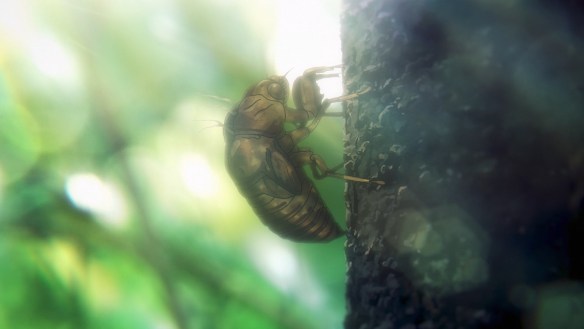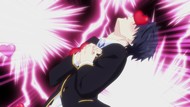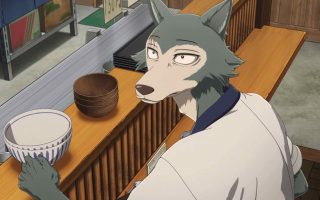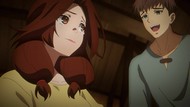Hello folks, and welcome back to Wrong Every Time. Today we are returning to the secluded foothills of Japan, to a town where shared history is etched on every tree and stone, and where a veneer of peaceful coexistence hides a rot so deep the stench is unbearable. Yes, we are returning to The Summer Hikaru Died, Ryohei Takeshita’s skillful adaptation of Mokumokuren’s intriguing manga, wherein our protagonist Yoshiki is grappling not just with the death of his best friend, but also with the continued presence of a creature directing his friend’s corpse, offering a pantomime of Hikaru’s old personality that every so often reveals the ravenous, bestial presence beneath.
So yeah, that’s quite a heavy load for a teenager, and so far this production is skillfully juggling a variety of threads – Yoshiki’s complex feelings towards both his absent friend and that friend’s replacement, the languorous atmosphere of rural Japan in the summer, the sense of perpetual surveillance intrinsic to small towns, and the occult/animalistic nature of Hikaru’s new pilot, a creature that seems to emphasize how we are all ultimately beasts, meant to consume and be consumed in turn. That the production is managing to successfully evoke all of these themes and feelings is a credit to Takeshita’s economic direction; Hikaru’s animation resources are clearly limited, but so much is being evoked through sound design, staging, and lighting choices that the lack of fluidity feels natural, one more echo of this town’s sleepy, stagnant atmosphere. Good horror is a precious rarity in anime, and Hikaru is so far proving an exemplary new addition to the canon. Let us return to the mountains!
Episode 2
We open on a discarded cicada shell still hanging from a tree trunk. An image that neatly embodies all three of the priorities outlined in this story’s very title – “Summer,” “Hikaru,” and “Death.” Cicada song is perhaps the most iconic tonal signifier of summer in Japan, but their reign is brief, the shells they leave behind outlasting their living presence. This in turn points towards Hikaru, who has himself undergone a cicada-like metamorphosis, but who could also be framed as no more than the shell left behind – a corpse hung up on strings, a skin with the substance removed. A very charged image!
We immediately jump from that image to Hikaru himself, making the connection between the two all the clearer. Different mediums have different ways of naturally juxtaposing distinct images or concepts, and for film or television, the match cut is one of the most reliable, even if it’s more a “thematic” match cut than a direct visual parallel
In spite of the bright sun, the scene doesn’t feel warm at all, a feeling we can attribute to the total lack of yellow tint in the composition. Orange and yellow light tends to feel warm and natural, while bright white light, light expressed fully as stark outlines and desaturation, tends to feel clinical and oppressive, perhaps even artificial
Police cars drive by, an aberration in the pastoral scene, an explicit sign of the community’s distress
Yoshiki clearly suspects Hikaru’s involvement. As the sunlight reaches Hikaru’s face, the show once again emphasizes his teeth; though he is smiling, it is like he is baring his fangs
Meanwhile, our ghost hunter is still on the case
Our OP is a rousing rock song, which frankly doesn’t fit the material at all. Shiki was able to get away with its Misfits-style OP because that show embraced a degree of camp from that start; in contrast, Hikaru is all-in on its consistent, oppressive atmosphere, and would be better suited by something like The Flowers of Evil’s OP
“Suspicion.” Perhaps the defining quality of small-town life, a lurking sea of local rumors hounding everyone
Once again, the production conserves resources by combining unseen characters discussing the old lady’s death with a pan over still scenery. No animation required, and we still got the strong tonal effect of seeing this classroom as a den of rumors, with the depth created by the foreground characters of this pan making us feel all the more trapped within the scene
Yoshiki’s hair is basically his last line of defense against Hikaru, included in these perspective shots like he’s peering out from behind a window curtain
A short-haired friend of Yoshiki mentions how he has to take a spooky mountain path home from school. It seems these villages are small enough that kids from several towns have to gather at this one school, creating a further sense of isolation. Shiki also used this well, basically tracking the sickness’ course by which sub-villages it had consumed
“When my eyes try to stray from the path, I freeze up.” An evil so unspeakable, so fundamental that we cannot even gaze upon it
He begs Yoshiki to walk him home, and Hikaru agrees first, revealing he has abandoned the “afraid of scary stuff” aspect of his original personality
This curly-haired girl already seems suspicious of Hikaru
Meanwhile, Tanaka continues his investigations. It seems the people of this town know him, and it appears like he has some kind of unusual scar or discoloration of the skin around his neck
Interestingly, it appears Tanaka’s group managed to stop some kind of destructive land development project that would have harmed the village, presumably something like the dam project in Rainbow Fireflies. Nice to see this story so quickly raising the specter of the genuine, mundane threats to Japan’s rural places
“Indo’s son went missing. Their ritual must have been a failure, causing ‘it’ to start acting up.” So whatever Hikaru represents, it is known to the village’s elders
Apparently the old woman had an encounter with “Nonuki-sama” as a child, and later lost her daughter under mysterious circumstances
“The more she fears it, the more it’s attracted to her.” A comment set against the image of the hamster on the wheel, running as fast as it can, but only increasing the speed of its track, never actually getting away. Their words resonate with our story – with all his friends beside him, the walk through the woods felt harmless. It is his fear that creates the danger, similarly to how Yoshiki keeps playing it cool, seemingly instinctively knowing that if he reveals his fear regarding Hikaru, it will all be over for him
Oh man, great sequence as Yoshiki actually makes contact with the creature in the woods, a tall-necked woman who is presumably the ghost of some hanging victim. Love how thoroughly they obscure this creature’s form for as long as possible, focusing largely on the ominous neck-cracking noises as its head lolls sickeningly from side to side. Much like Hikaru’s host, if you see it clearly, you are lost
So it’s not just Hikaru; these forests are actually full of malevolent local spirits. In fact, it seems like Hikaru might actually be able to protect Yoshiki, as his ally from the “other side”
Meanwhile, Tanaka reveals he found the bag Hikaru brought up the mountain, and the warped skull-like stone within it
Apparently the stone is adept at warding off spirits. But Tanaka suspects the creature has already found a way to hide within the village
The curly-haired girl Ah-chan seems to have some attunement to spirits, as she notices the sound of the creature dying. That’s gotta be bad news for her, as we’ve learned only ignorance can protect you
“That thing wanted to latch onto you. So I crushed it and ate it.”
“Don’t look at anything else but me.” Hikaru’s words double as practical advice and a kind of jealousy, a desire to be Yoshiki’s only special aberration
“I’m the only one allowed to latch onto you”
Yep, after they all leave, Ah-chan reflects that she was the only person to really hear what happened, and Hikaru notices her unique reaction. Trouble brewing for her
Hikaru’s thoughts seem to conflate love with consumption, a common combination. An all-consuming desire can be either passionate or violent, and if the target of your ardor is denied to you, “I’ll destroy them rather than let another take them” is at times a natural next thought
Hikaru “remembers” a conversation with his father, who warned him to marry whoever he loves quickly, so they would be similarly protected by their family’s contract with the mountain spirit. A feeling that’s clearly entwining with this new entity’s own desires
Interestingly, what the young Hikaru took away from this conversation was not that the forest spirits are dangerous, but that they are lonely – sympathy for the outsider, an instinct that seems quite pertinent to this story of Hikaru’s apparent love for his best friend in a rural, rumor-laden, inherently conservative village
The foundations of conservatism are essentially veneration of the self and fear of the unknown; from curiosity generally stems empathy, and conservatives are by their nature incurious. We’ve dealt with the push and pull of conservatives’ fundamental anti-humanism for centuries, but it seems like we might finally be reaching the point where we simply cannot coexist with the conservative mind; their desires are too destructive if unchained, and in a post-Trump world, there is no more expectation of propriety making conservatives pretend to be good people
The next scene makes this romantic/sexual dimension all the more explicit, as Hikaru asks “you wanted to know what was inside me, right?” in a sequence framed in golden sunset colors, a scene more warm and intimate than anything in this episode so far
In a town defined by false impressions and negative rumors, Hikaru wants to be understood by Yoshiki, desires the intimacy of sharing everything
An odd navigation of boundaries and comfort levels, Yoshiki unsure what he desires, Hikaru unsure how far he can push. What a strange, wonderfully intimate scene
It’s no surprise that horror and queer love stories are so often aligned; as people who are often defined as “monsters” by society, there can be a comfort in being embraced by fellow outsiders, and a freedom in celebrating the messiness of human emotions and bodies. To embrace being a “monster” is to accept all the truths society wishes to ignore, to revel in the messiness of sincere emotion and self-expression. Conservatives fear monsters, but to those who are framed as monsters through no choice of their own, it is a great comfort to know there is a community for us as well
“Those Yamizakis were wondering too.” The next scene is framed as menacingly as possible, with this lady at the grocery store framed as a pit of gnashing teeth, spewing hearsay like she’s chewing on the very lives of her neighbors. Consumption again, but this time framed not as physical eating, but the sort of sin-eating of gossip
A focus on red checkout lights and hands, framing this sequence as far more invasive than Yoshiki literally sticking his hand in Hikaru’s chest, because this woman is invading Yoshiki’s life uninvited
We even cut to one shot from the security camera, further emphasizing the public, surveilled nature of this interaction
The woman who noticed Hikaru’s nature in the first episode stops Yoshiki outside the shop, warning him “mix with that too much, and you won’t be human anymore.” Love this composition framing the two of them through the spokes of the bikes on this rack, as if they’re at the center of a spider’s web
“Give me a call when you’re ready to talk.” Yeah, I doubt this lady’s lasting that long
And the cicada is of course our final image – will it morph only to be devoured, like this lady fears, or will it survive by melding with Hikaru’s nature?
Our ED is more appropriate, focusing on an altered-photography trip shared by our leads that embodies what Yoshiki is trying to hold onto
And Done
Whew, things are not going well in Yoshiki’s little town! It seems there are numerous malevolent entities haunting these woods beyond Hikaru’s possessor, while Hikaru himself is becoming more bold and obvious in his divergent nature, which will undoubtedly bring him into conflict with the town’s most suspicious or supernaturally attuned residents. This episode did an excellent job of building all that tension while expanding on its principle metaphors, shifting Hikaru’s conflict from reflecting a general fear of outsiders to embodying the particular urgency of a queer love story in an old-fashioned, gossip-ridden village. The direction remains excellent, and the story is ably juggling character drama, crime procedural, and delicious flourishes of folk horror. This town is likely doomed, but this production is going great!
This article was made possible by reader support. Thank you all for all that you do.




